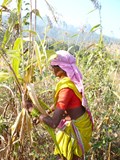
Food and Agriculture Organization of the United Nations (FAO) has started its first ever Global Conference on Animal Health Innovation, Reference Centres, and Vaccines. This significant event is focused on addressing animal diseases, which are responsible for global economic losses of hundreds of billions of dollars annually and pose serious risks to human health, food security, and livelihoods worldwide.
One of the major concerns discussed at the conference is the impact of infectious diseases, emerging pathogens, and the burden of endemic illnesses on livestock systems, which are further exacerbated by climate change. These challenges require a collaborative global approach, leveraging available knowledge and resources to improve animal health.
The three-day event brings together experts and leaders from various countries, including government representatives from Ethiopia, Uganda, and India, alongside international organizations and animal health specialists. The goal is to explore ways to integrate existing strategies with new and innovative solutions to mitigate the burden of animal diseases.
Animal illnesses such as peste des petits ruminants (PPR), highly pathogenic avian influenza (HPAI), and African swine fever (ASF) are directly linked to the decreased productivity of livestock, leading to significant financial losses. It is estimated that these diseases cost the global economy up to USD 300 billion each year, with approximately 20 percent of animal production lost due to disease. Additionally, around 75 percent of emerging animal diseases have the potential to be transmitted to humans.
Vaccination remains one of the most effective methods for preventing and controlling both emerging and re-emerging diseases. It helps reduce animal mortality, minimize economic losses, decrease the need for antibiotics, and protect human health. As a result, vaccination also contributes to food security and supports the livelihoods of farmers.
The conference's objective is to promote global efforts in enhancing animal health, preventing disease outbreaks, and fostering sustainable livestock production, with a focus on implementing the One Health approach. However, several challenges, including infectious diseases and climate change, must be addressed to improve livestock productivity and resilience in the long term.
















